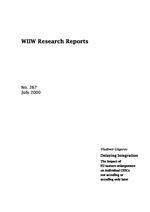Delaying Integration. The impact of EU eastern enlargement on individual CEECs not acceding or acceding only later
Vladimir Gligorov
wiiw Research Report No. 267, July 2000
44 pages including 6 Tables and 1 Figure
The process of European Union (EU) integration proceeds from economic to political integration. The economic integration itself proceeds from trade to financial to complete market integration. The sustainability of the process depends on some causal relation existing between economic and political integration. This causality is captured, in this paper, in the proposition that price-taking leads to policy-taking. This proposition of integration is defended against arguments from diverse sources and fields that maintain that homogeneity is necessary for integration or, in other words, that diversity stands in the way of integration. New developments in political philosophy (Rawls), social choice theory, macroeconomics and new institutional economics are reviewed with respect to their importance for the actual problems that EU integration and enlargement face.
In the second part of the paper a converse of the proposition on integration is discussed. This proposition on disintegration states that policy-setters are price-setters too. Assuming the truth of the proposition, it follows that policy divergence, i.e., delayed integration, can be explained in terms of the political economy of the process. The benefits in the delay can be found in the possibility of relying on institutional and policy arrangements the use of which becomes feasible if integration is delayed. These benefits are mainly distributive and not allocative, i.e., they accrue from the use of less-than-democratic and other-than-market instruments of distribution of national resources.
These political economy considerations apply mostly to those countries that are, actually or potentially, economically integrated with the EU, but are delaying or postponing their political integration. These are called 'stay-outs'. There are also those that can be classified as 'left-outs', i.e., countries that are not politically integrated with the EU because the EU is not ready to take them in. There are also 'opt-outs', which are countries that decide to stay out of one or the other facet of EU integration (e.g., from the monetary union). Apart from all these 'outs', there are countries that are outsiders. Examples are countries like Ukraine or Russia. These are countries which are, at the minimum, not economically integrated with the EU, temporarily or permanently. It is assumed that it is all but impossible for a country to be politically integrated into the EU and economically disintegrated from it.
Given this complex political geography of the EU, the costs of stay-outs are studied. It is first illustrated that their actual or potential trade integration with the EU is quite high. Thus, these are countries that reveal inconsistent preferences: their economic preferences are for integration, while their political preferences are against it. One would expect that their economic policy would be such as to stand in the way of their economic development. This fact is illustrated by looking at the divergence of their money markets from those in the EU. Given that they have significantly higher inflation than the EU and given that their interest rates are also significantly higher, their actual growth rate should be lower than the potential one. This lower than possible growth rate is the main cost of their policy of delaying integration.
Keywords: diversity, transition, integration, EU enlargement, monetary policy
JEL classification: F15, F5, P20
Countries covered: Visegrad countries, CIS, SEE
Research Areas: Macroeconomic Analysis and Policy, International Trade, Competitiveness and FDI
